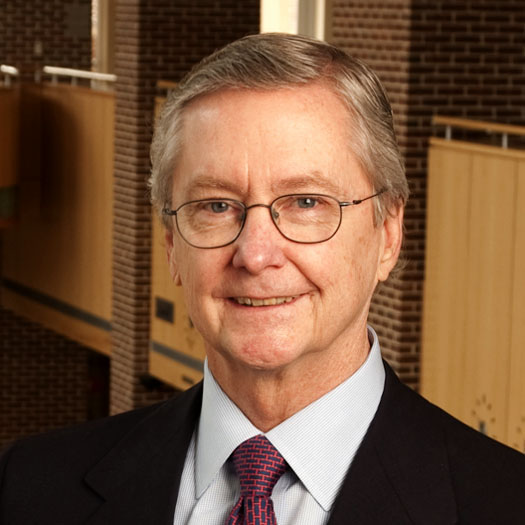Trustee Chair Carl Sewell honored at May board meeting
SMU honors Dallas businessman Carl Sewell for his leadership during four years as board chair.

DALLAS (SMU)—Dallas business leader Carl Sewell was honored at the May meeting of the SMU Board of Trustees with a resolution recognizing his leadership of University advancements during his four-year term as board chair.
Sewell joined the SMU Board of Trustees in 1996. He served on numerous standing committees of the board and as vice chair from 2004-06, chair-elect from 2005-06 and board chair from 2006-10, concluding his term at the May meeting. He remains a board member, co-chairing the Trusteeship Committee and serving on committees for Academic Policies and Planning, Athletics, and Executive/Personnel/ Compensation.
A 1966 graduate of SMU, Sewell is chair of Sewell Automotive Companies and a national leader in the automotive industry.
As chair of the Board of Trustees, “Mr. Sewell has led by sharing his experience, skills and thoughtful insight into Board policy-making, but also through his generous financial support which has materially aided the University in achieving a leadership role in higher education in the Southwest and becoming a nationally recognized university,” the resolution states.
Carl Sewell has led the Board in establishing and supporting a goal of raising SMU’s academic profile and providing competitive scholarships to attract greater numbers of high-achieving students. He and his wife, Peggy, have provided major funding of the President’s Scholars program, the University’s highest merit award providing full tuition, study abroad and other benefits.
Sewell also contributed significantly to the success of The Campaign for SMU: A Time to Lead, which raised $542 million from 1997-2002. Now he is one of five co-chairs leading SMU Unbridled: The Second Century Campaign, launched in 2008 with a goal of $750 million. To date the campaign has raised $432 million.
During Sewell’s tenure as chair of the SMU Board of Trustees, many significant University advancements occurred with impetus from the Board. Highlights follow:
- Through The Second Century Campaign, SMU established five centers/institutes, named two schools and one academic department and established record numbers of endowed faculty positions and academic endowments.
- Reflecting the growing quality of the student body, SMU students won a record number of competitive national awards, including six Fulbright Scholarships, a Truman Scholarship, three Fellowships to the Center for the Study of the Presidency and a Goldwater Scholarship.
- The number of President’s Scholars increased to 114, including 42 Sewell-funded President’s Scholarships in the 2009-10 academic year. Cox BBA Scholars and Lyle Engineering Scholars also increased. Two new scholar programs were added —Meadows Scholars in Meadows School of the Arts and Dedman Scholars in Dedman College of Humanities and Sciences.
- Two SMU professors were elected to the American Academy of Arts and Sciences: Robert H. and Nancy Dedman Professor of History David Weber in 2007, and Elizabeth Scurlock University Professor of Human Values Charles Curran in 2010. Henderson-Morrison Professor of Prehistory David Meltzer was named to the National Academy of Sciences: in 2009.
- Faculty research funding increased from $20.5 million to $25 million from 2006-07 to 2009-10.
- SMU was chosen as the site of the George W. Bush Presidential Center, opening in 2013. As part of the center, the Bush Institute already is hosting campus seminars on topics of global interest.
- In FY09 SMU received the most gifts in its history, more than $104 million. Annual giving by alumni grew from 13.8 percent in FY06 to 19 percent in FY09.
“Carl Sewell is a visionary leader who sets high goals and expectations but also provides the resources that enable progress to be made,” said SMU President R. Gerald Turner. “He has brought his expertise in management and marketing to bear in helping SMU to advance in quality among national universities and to make new audiences aware of that progress.”
# # #